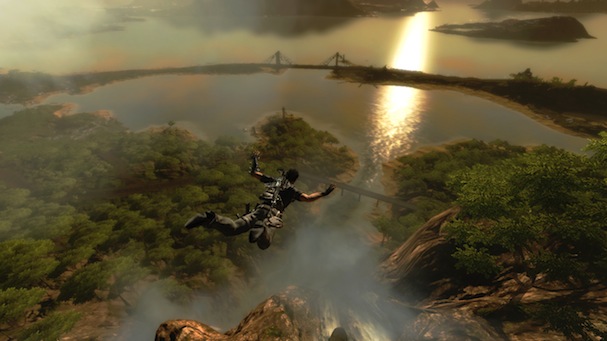
I like to spend my Sunday afternoons in the car with the radio on, driving around my busy little suburban town in my '93 Camry. I get a lot of pleasure from this. Watching the world careen past you through a sheet of glass is one of life's small marvels; you feel that you could go anywhere and do anything with just one wanton turn down a street you've never ventured. There's some sort of elusive pleasure from just being, a pleasure I hardly ever have time for these days. It's that happiness you felt as a kid when you'd get the urge to just run around and frolic, when a tree or a pile of dirt was something to conquer, not an obstacle in your path.
Rico Rodriguez, the playful protagonist of Just Cause 2, hasn't forgotten that happiness. He's a suave-as-hell grown man whose preferred method of travel is the flamboyant combination of a parachute and a hook-shot. Dumped onto the island of Panau, Rico is told to cause chaos to elicit the retaliation of an oppressive government and save the people of Panau. Every impulse is sanctioned, any urge condoned.
Even though most actions will contribute towards "beating" the game, there is no real sense of progression because every instance of forward momentum points back to causing chaos, a kind of ball-and-chain that asks you to blow stuff up and have fun with it. The island of Panau is a humongous sprawl rivaling the Washington, D.C., of Fallout 3 in terms of scope, but it's ultimately no more than a giant playground for Rico to scale mountains, jump motorcycles, and generally act like there were only five minutes left of recess.
Every interaction with the island is destructive. Certain structures are marked with a white star, which simply means you can demolish them. That demolition alerts the government, who send out soldiers who shoot at you on sight — because who wouldn't fire at the maniac attaching explosives to everything he touches? So you shoot them first.
Luckily, this destructive interaction remains entertaining for quite some time. Just Cause 2 does a good job of making the annihilation viscerally satisfying. Rigging a whole fuel depot to blow and triggering it from the next town over is a rewarding process that doesn't get old too fast. Like the cops-and-robbers fantasies we played in our backyards, it's fun to horse around and pretend like the world depends on us enjoying our fun. All the production values in Just Cause 2 serve that.

But I discovered a more simple, innate joy in the island of Panau: exploring it. If you grabbed a motorcycle and rode it from one edge of the island to the other, you'd probably clock in at a bit under an hour. It's a beautiful sprawl, filled with vistas that stretch from the frigid mountains down to the balmy beaches. The game world never seems to end.
It's so large that you could spend an hour or two in a beat-up truck driving past rural fishing villages and up a mountain road, then hijacking a plane and coasting over the ocean. Or you could find the highest mountain and parachute off of it, just to admire the scenery.
Once during my travels, as I floated above a mountain range with my parachute, I saw a cluster of pink blots. I released my parachute to skydive down for a closer look. I'd found a field of vibrant cherry blossom trees, an oasis of pink vegetation pocketed in the folds of a ridge. It served no purpose; there was really nothing else there, except a stone tower from which to admire the field.
Just Cause 2 is the kind of game where you can steal a motorcycle intending to reach an objective a kilometer away, only to find yourself sidetracked by the pleasure of this little slice of paradise on your TV. You'll feel the impulse to drive as fast as you can and scale everything you can see, and the ease with which you can do these things will fill you with a giddy energy. You might even feel something profound.
And then you'll accidentally crash your motorcycle and forget all about that as the glorious explosion rips around you.


